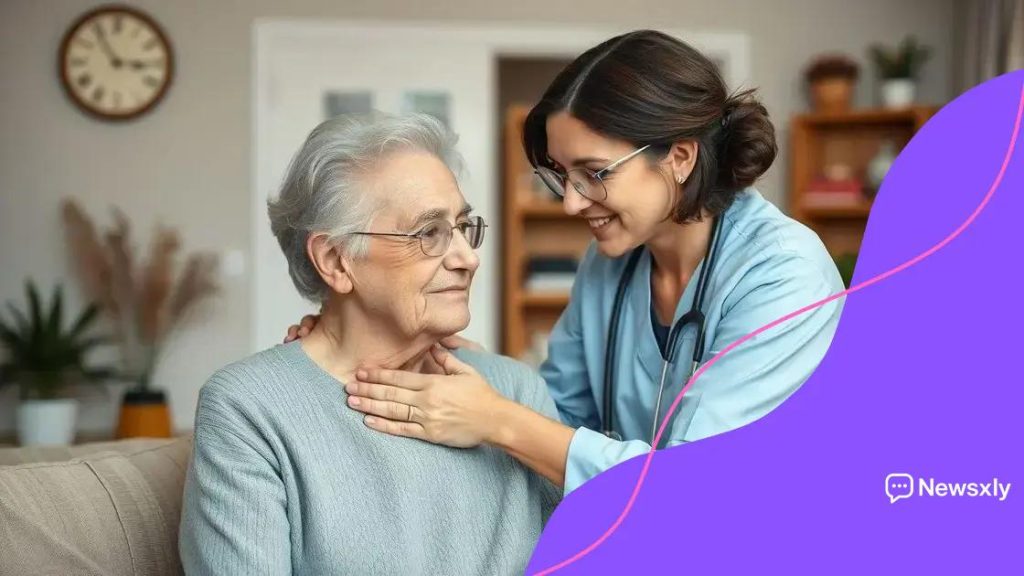Elder care benefits and resources you should know

Elder care benefits and resources include financial assistance from government programs like Medicare and Medicaid, nonprofit organizations offering grants, and community support services aimed at enhancing the quality of life for seniors.
Elder care benefits and resources play a crucial role in enhancing the quality of life for seniors. Have you ever wondered how the right programs can make a difference in their daily lives? Let’s dive into this topic and uncover the support available.
Understanding the importance of elder care
Understanding the importance of elder care is crucial as it directly affects the well-being of our aging loved ones. Elder care isn’t just about meeting basic needs; it enhances quality of life and maintains dignity.
As people grow older, they often face challenges that can be overwhelming. From medical issues to daily activities, having appropriate support is essential. Recognizing the importance of this support helps families make informed decisions.
The Role of Family and Caregivers
Family members and professional caregivers play integral roles in elder care. It is vital for both groups to understand their responsibilities. Proper education and training can help them provide better care.
- Understanding medical needs and medications.
- Creating a safe living environment.
- Offering emotional support and companionship.
Additionally, family involvement can lead to improved mental health for seniors. Social interaction can combat feelings of loneliness, which is common among the elderly.
Financial Considerations
Providing elder care can be costly. It is important to explore different options to manage expenses effectively. A few resources include government assistance programs and local community services.
- Medicaid and Medicare options.
- Nonprofit organizations offering support.
- Local senior centers providing activities and healthcare screenings.
Understanding the financial aspects can alleviate some pressure on families. This knowledge allows them to focus on the essential task of caring for their loved ones.
Overall, recognizing the significance of elder care allows families to embrace their roles better. With the right support, seniors can lead fulfilling lives. It’s about creating a nurturing environment.
Key benefits of elder care programs
Key benefits of elder care programs play a vital role in ensuring our loved ones receive the best support as they age. These programs provide more than just basic assistance; they offer a range of advantages that enhance the quality of life for seniors.
One primary benefit is the specialized care tailored to the unique needs of elderly individuals. With trained professionals at their side, seniors can enjoy a higher standard of living while receiving help with daily tasks.
Improved Health and Well-being
Elder care programs often include access to healthcare services that prioritize the physical and mental health of seniors. Regular check-ups and medication management are essential aspects of these programs. With consistent care, seniors can maintain their health better, reducing hospital visits.
- Access to skilled nursing professionals.
- Regular monitoring of chronic conditions.
- Nutrition and meal planning tailored for seniors.
Additionally, receiving care from trained professionals can alleviate stress for families. Knowing their loved ones are in good hands allows family members to focus on their own well-being as well.
Social Interaction and Engagement
Another crucial benefit is the enhancement of social interaction. Elder care programs provide opportunities for seniors to connect with peers, reducing feelings of loneliness. Activities such as group outings, games, and workshops foster connections among participants.
- Organized social events and activities.
- Community resources for entertainment and engagement.
- Support groups for caregivers and seniors.
These interactions are essential for keeping seniors mentally sharp and emotionally fulfilled. Engaging socially can lead to improved mental health and overall happiness.
By understanding the key benefits of elder care programs, families can make informed choices that will lead to better care for their loved ones. Each aspect of these programs contributes significantly to the well-being of seniors, ensuring they experience their golden years with dignity and joy.
Available resources for elder care support

Available resources for elder care support are essential for families looking to provide the best care for their aging loved ones. With so many options available, it’s important to know what resources exist to assist in this journey.
One primary source of support comes from nonprofit organizations that specialize in elder care. These organizations often provide various services, including counseling, meal delivery, and companionship programs. Utilizing these resources can significantly ease the burden on families.
Government Programs
Government programs also play a crucial role in supporting elder care. Programs like Medicare and Medicaid offer valuable benefits for seniors. They help cover medical expenses and provide access to necessary healthcare services.
- Medicare assists with hospital visits and medical treatments.
- Medicaid offers financial support for those with low income.
- Veterans’ benefits provide additional support for senior veterans.
In addition to financial assistance, many states have their own programs that focus on elder care, including home and community-based services that help seniors remain independent at home.
Community Resources
Community centers often host programs specifically designed for seniors. These may include social activities, fitness classes, and educational workshops. Such resources can improve both physical health and social engagement for seniors.
- Local senior centers provide a place for seniors to meet and socialize.
- Health fairs offer screenings and information on wellness.
- Workshops on technology help seniors stay connected and informed.
Connecting with local resources can empower families to help their loved ones thrive in their communities. By utilizing these available resources, families can find the necessary support to enhance their loved ones’ quality of life.
How to navigate elder care services
How to navigate elder care services can be a challenging experience for families. Knowing where to start and what to look for is key to finding the right support for your loved ones. Understanding the options available can make this process smoother.
First, it’s important to assess the specific needs of the elder person. This includes their medical requirements, daily living activities, and social needs. By identifying these aspects, families can prioritize what services will be most beneficial.
Research Available Options
After assessing needs, the next step is to research the types of elder care services available. Different programs cater to various needs, so taking the time to explore your options is critical.
- In-home care services provide assistance with daily activities.
- Skilled nursing facilities offer more comprehensive medical care.
- Adult day care centers provide social activities and supervision.
Another useful approach is to consult with healthcare providers. Doctors can often recommend reputable elder care services tailored to the elderly person’s medical conditions. This professional guidance can help narrow down choices.
Plan and Arrange Services
Once suitable options are identified, it’s time to plan and arrange the services needed. This may involve scheduling assessments with care providers or setting up interviews with potential caregivers. Families should feel comfortable asking questions about services offered and the qualifications of the staff.
- Discuss fees and payment options early on.
- Review care plans to ensure they meet expectations.
- Confirm availability for flexibility in scheduling.
Finally, maintaining open communication with caregivers and service providers is essential. Regular check-ins can help ensure that the care being provided meets the elderly person’s needs. Adjusting care plans as necessary will allow families to navigate elder care more effectively, ensuring their loved ones receive the best support possible.
Financial assistance options in elder care
Financial assistance options in elder care are crucial for families looking to provide the best support for their aging loved ones. Navigating the costs associated with elder care can be overwhelming, but various options exist to help ease the financial burden.
Understanding these financial assistance options can empower families to make informed decisions. First, government programs like Medicare and Medicaid provide significant financial support for medical expenses related to elder care. These programs can cover hospital visits, nursing home care, and necessary medications.
Government Aid Programs
Many programs specialize in assisting seniors with their healthcare costs. It’s essential to explore each program’s eligibility requirements and benefits.
- Medicare covers eligible seniors for medical services and hospital stays.
- Medicaid helps low-income individuals pay for long-term care.
- The Department of Veterans Affairs provides benefits for veteran seniors that can help with care costs.
In addition, some states have their own programs designed to help seniors with the cost of living. These can include subsidies for housing, food assistance, or even transportation services to medical appointments.
Nonprofit Organizations and Grants
Many nonprofit organizations offer grants and assistance programs designed specifically for elder care. These organizations often provide funding for resources such as in-home care, meal delivery, and support groups.
- The National Council on Aging offers information on financial assistance programs.
- Local charities may provide specific help or food programs.
- Community grants can aid in covering elderly care needs.
Additionally, families can consider private insurance options that cover specific elder care services. Long-term care insurance can significantly reduce out-of-pocket expenses.
Overall, understanding and utilizing these financial options can greatly benefit families providing elder care. By exploring various resources, families can ensure their loved ones receive the care they need without enduring financial hardship.
FAQ – Frequently Asked Questions about Elder Care
What financial assistance options are available for elder care?
Financial assistance options include government programs like Medicare and Medicaid, as well as various nonprofit organizations that offer grants and resources.
How can I find the right elder care services?
Start by assessing the specific needs of your loved one, then research available options, such as in-home care or assisted living facilities.
What role do community resources play in elder care?
Community resources provide essential support, including social activities, health screenings, and meals, helping seniors stay connected and engaged.
Why is open communication important with caregivers?
Open communication ensures that caregivers provide the best personalized care and allows families to address any concerns or changes in their loved one’s health.





